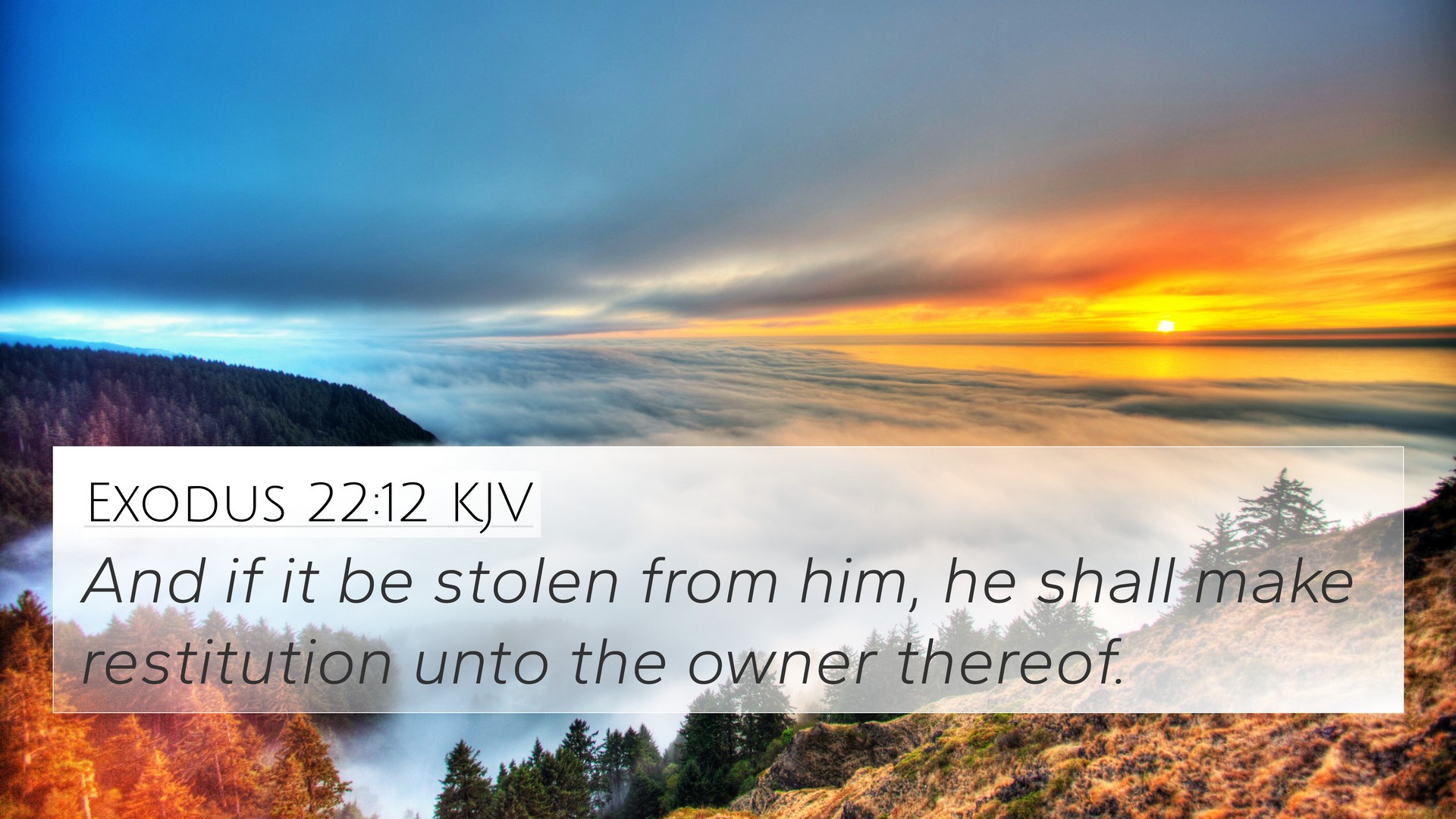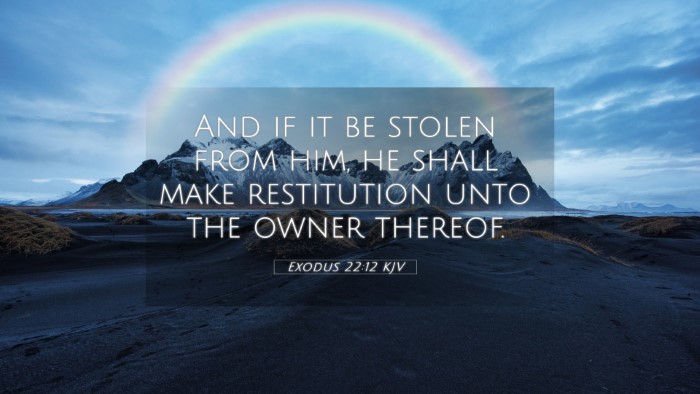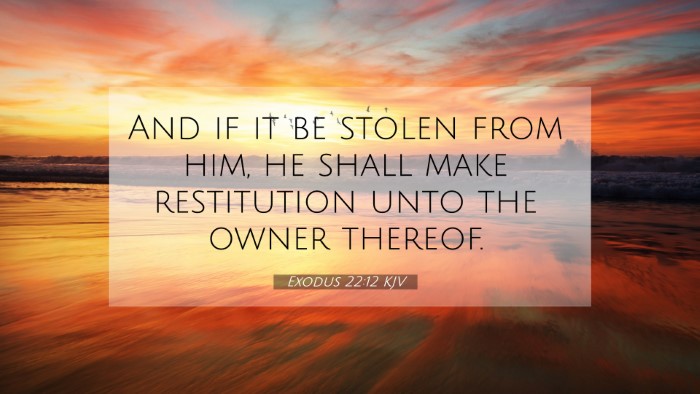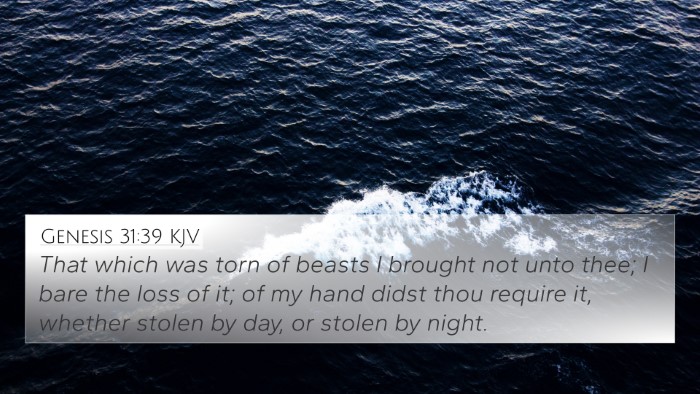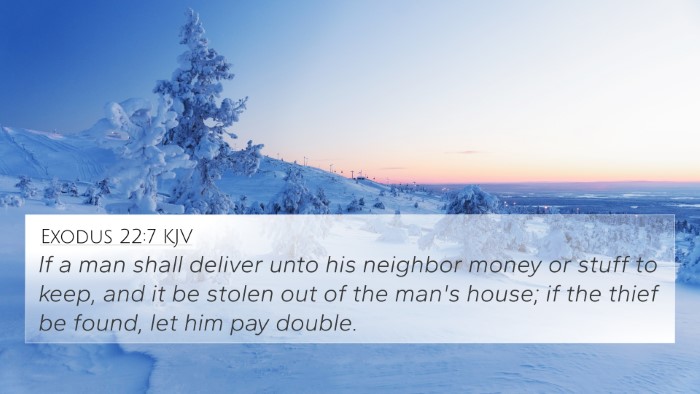Understanding Exodus 22:12
Verse Context: Exodus 22:12 states, "But if it be stolen from him, he shall make restitution unto the owner thereof." This verse addresses the responsibility of a person who has borrowed an item and the obligation to compensate the owner if the item is lost or stolen.
Interpretation from Public Domain Commentaries
Matthew Henry:
Matthew Henry notes that this verse illustrates the principle of justice regarding borrowed goods. It emphasizes the duty of the borrower to not only return the items but also to assume responsibility in case of theft. Henry stresses the moral obligation one has towards members of the community, reinforcing the idea that honesty and integrity are essential values in dealings with others.
Albert Barnes:
Albert Barnes expounds on the idea that this law is crucial in establishing trust between individuals. He highlights that the restitution mentioned is not merely financial but also speaks to the relational aspect of trustworthiness and accountability. Barnes draws parallels to the broader context of social responsibility found throughout the Scriptures.
Adam Clarke:
Adam Clarke provides insights on the legal implications within this passage, stating that it serves as preventive law meant to discourage negligence in care of borrowed items. Clarke emphasizes that the law reflects a higher moral order which is endorsed by divine authority, suggesting that true justice encompassed both civil law and divine principles.
Thematic Connections and Cross-References
This verse can be connected to several other passages that reinforce themes of responsibility, justice, and restitution. Below are some relevant cross-references:
- Exodus 22:14: Further outlines responsibilities for borrowed items.
- Leviticus 6:2-5: Discusses the requirement for restitution in various contexts, indicating a wider application of accountability.
- Numbers 5:6-7: The call to confess and make restitution for wrongdoing, furthering the theme of accountability.
- Proverbs 3:27: Advises not to withhold good from those to whom it is due, highlighting the importance of ethical conduct.
- Luke 19:8: Zacchaeus, the tax collector, exemplifies the principle of restitution after repentance.
- Matthew 5:23-24: Highlights the importance of reconciliation and addressing wrongs between individuals.
- 1 Peter 4:15: Advises believers to ensure that they do not suffer for wrongdoing, emphasizing the importance of living honorably.
Exploring the Biblical Framework
Exodus 22:12 serves to highlight the responsibility one has towards others, creating a framework for ethical behavior and communal trust. This extends beyond the immediate application within Exodus, demonstrating a larger biblical narrative surrounding justice, accountability, and relational ethics.
Concepts of Justice and Restoration
The principle of restitution encompasses the underlying need for justice in biblical laws. The act of returning or compensating is not simply about material value but also about restoring relationships and honoring commitments made to one another in society.
Practical Applications
For modern readers, this passage provides insightful lessons on personal responsibility and ethical dealings. It encourages individuals to think critically about their relationships and interactions with others, whether in personal or communal settings.
Conclusion
In summary, Exodus 22:12 provides a vital lesson about accountability and the moral weight of our obligations to one another in society. By understanding this verse through various commentaries and connecting it with other biblical texts, readers can appreciate the depth of its meaning and its application in today's context.
